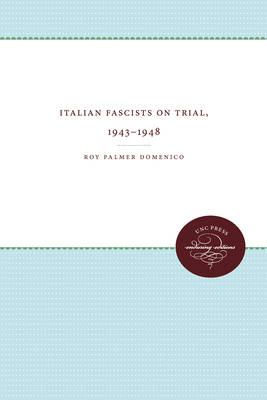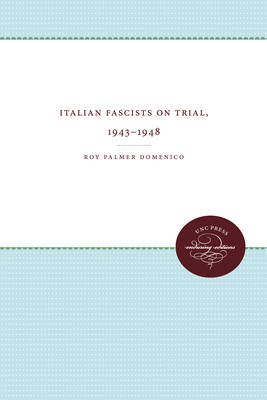
- Retrait gratuit dans votre magasin Club
- 7.000.000 titres dans notre catalogue
- Payer en toute sécurité
- Toujours un magasin près de chez vous
- Retrait gratuit dans votre magasin Club
- 7.000.0000 titres dans notre catalogue
- Payer en toute sécurité
- Toujours un magasin près de chez vous
76,45 €
+ 152 points
Description
Roy Domenico describes and evaluates the controversial efforts in Italy to punish Fascists after the overthrow of Mussolini in 1943 and the more violent efforts to do so after the liberation of German-occupied northern Italy in 1945. He focuses on the trials and bureaucratic purges of Fascists and illuminates the political struggles between those who favored the sanctions and those who opposed them.
According to Domenico, sanctions against Fascists were complicated by a widespread inability to define and place blame. Those most likely to be tried, he argues, were symbolic or strategic figures who were prominent in the dictatorship or were otherwise closely identified in the public's mind with the regime and whose prosecution would make a dramatic impression. The scope of sanctions was restricted further by focusing on those who served Mussolini's collaborationist Salo regime and away from the Fascists of the 1922-43 dictatorship.
The British and Americans were ambivalent about prosecuting the Fascists in part, says Domenico, because they did not look upon Italian fascism as nearly as objectionable as German nazism. In theory, they wanted the most notorious Fascists to be investigated and punished, but in practice, they did not want to create bureaucratic chaos in what was left of the weak Italian state or to strengthen the far Left. Further, the outbreak of the civil war in liberated Greece in the winter of 1944-45 alarmed many, who feared that civil war might erupt in northern Italy as well.
Domenico concludes that although Italy dismantled a dictatorship and became a democratic republic in the space of three years, the Italian experience nevertheless illustrates the resilience of the old order and its tenacity in maintaining influence.
Originally published in 1991.
A UNC Press Enduring Edition -- UNC Press Enduring Editions use the latest in digital technology to make available again books from our distinguished backlist that were previously out of print. These editions are published unaltered from the original, and are presented in affordable paperback formats, bringing readers both historical and cultural value.
According to Domenico, sanctions against Fascists were complicated by a widespread inability to define and place blame. Those most likely to be tried, he argues, were symbolic or strategic figures who were prominent in the dictatorship or were otherwise closely identified in the public's mind with the regime and whose prosecution would make a dramatic impression. The scope of sanctions was restricted further by focusing on those who served Mussolini's collaborationist Salo regime and away from the Fascists of the 1922-43 dictatorship.
The British and Americans were ambivalent about prosecuting the Fascists in part, says Domenico, because they did not look upon Italian fascism as nearly as objectionable as German nazism. In theory, they wanted the most notorious Fascists to be investigated and punished, but in practice, they did not want to create bureaucratic chaos in what was left of the weak Italian state or to strengthen the far Left. Further, the outbreak of the civil war in liberated Greece in the winter of 1944-45 alarmed many, who feared that civil war might erupt in northern Italy as well.
Domenico concludes that although Italy dismantled a dictatorship and became a democratic republic in the space of three years, the Italian experience nevertheless illustrates the resilience of the old order and its tenacity in maintaining influence.
Originally published in 1991.
A UNC Press Enduring Edition -- UNC Press Enduring Editions use the latest in digital technology to make available again books from our distinguished backlist that were previously out of print. These editions are published unaltered from the original, and are presented in affordable paperback formats, bringing readers both historical and cultural value.
Spécifications
Parties prenantes
- Auteur(s) :
- Editeur:
Contenu
- Nombre de pages :
- 315
- Langue:
- Anglais
Caractéristiques
- EAN:
- 9780807865309
- Date de parution :
- 01-06-11
- Format:
- Livre broché
- Format numérique:
- Trade paperback (VS)
- Dimensions :
- 152 mm x 229 mm
- Poids :
- 462 g

Les avis
Nous publions uniquement les avis qui respectent les conditions requises. Consultez nos conditions pour les avis.






